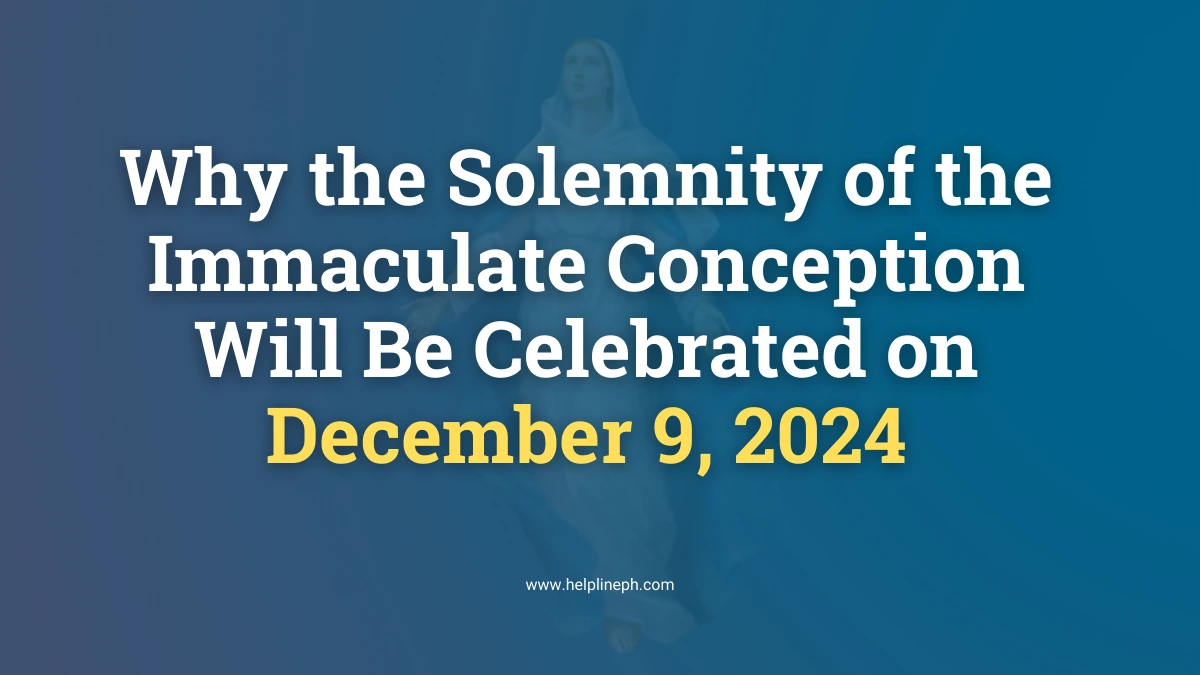The Solemnity of the Immaculate Conception of the Blessed Virgin Mary is one of the most important celebrations in the Catholic Church. Normally observed on December 8, this feast honors the belief that Mary, the mother of Jesus, was free from original sin from the moment of her conception. However, in 2024, the celebration will be moved to December 9. Let’s explore why this change is happening and what it means for Catholics.
Why Is the Date Changing?
In 2024, December 8 falls on a Sunday, which is also the Second Sunday of Advent. Advent is a significant time in the Church’s calendar, marking the start of the liturgical year and a period of preparation for Christmas, celebrating the birth of Jesus. According to the norms of the Liturgical Calendar, a Sunday of Advent takes precedence over other celebrations, including solemnities like the Immaculate Conception.
To accommodate this, the Catholic Church has moved the feast to the following Monday, December 9. This adjustment follows long-standing Church rules: solemnities that coincide with Sundays in Advent or Lent are transferred to the next day unless they fall on Palm Sunday or Easter Sunday.
The Immaculate Conception: What Does It Mean?
The Immaculate Conception refers to the Church’s teaching that Mary was preserved from original sin from the moment she was conceived in her mother’s womb. This special grace prepared her to be the mother of Jesus Christ. The dogma was formally proclaimed in 1854 by Pope Pius IX through the papal bull Ineffabilis Deus.
This belief is one of the four major Marian dogmas of the Catholic Church. The other three are:
- Mary’s Perpetual Virginity – She remained a virgin before, during, and after the birth of Jesus.
- Mary’s Assumption – She was taken body and soul into heaven.
- Mary as the Mother of God – She is the mother of Jesus, who is both God and man.
Is It Still a Holy Day of Obligation?
The Solemnity of the Immaculate Conception is traditionally a holy day of obligation for Catholics, meaning they are required to attend Mass. However, in the Philippines, the situation is unique for 2024.
The Catholic Bishops’ Conference of the Philippines (CBCP) requested an exception from the Vatican, considering the difficulties many Filipino daily wage earners might face in attending Mass on a working day. The Vatican approved the request, stating that the obligation to attend Mass on December 9, 2024, does not apply.
According to Ilagan Bishop David William Antonio, this decision acknowledges the reality that many Filipinos depend on daily wages to support their families. Skipping work to attend Mass could cause financial hardship, so the Church has made participation voluntary for this year.
Is December 9 a Public Holiday?
As of now, it is unclear whether the Philippine government will adjust the holiday schedule for 2024. Under Republic Act 10966, December 8 is recognized as a special non-working holiday in the country to honor the Immaculate Conception, the principal patroness of the Philippines. This law, enacted in 2017 during the administration of former President Rodrigo Duterte, does not automatically move the holiday when the liturgical date changes.
Catholics in the Philippines will need to wait for an official announcement from Malacañang regarding whether the holiday will also be transferred to December 9.
How Can Catholics Celebrate?
Even though attending Mass is not obligatory on December 9, 2024, Catholics are still encouraged to honor the feast in meaningful ways. Here are some suggestions:
- Pray the Rosary: Reflect on Mary’s role in salvation and her Immaculate Conception.
- Participate in Church Activities: Many parishes may hold special Masses or devotions for those who can attend.
- Teach the Faith: Share the story and significance of the Immaculate Conception with family and friends, especially children.
- Act of Charity: Follow Mary’s example of humility and service by helping those in need.
Frequently Asked Questions
What is the Immaculate Conception?
The Immaculate Conception is the belief that Mary was free from original sin from the moment of her conception. This unique grace made her a fitting mother for Jesus Christ.
Why is the feast moved to December 9 in 2024?
Since December 8 falls on the Second Sunday of Advent, the feast is transferred to the following Monday, December 9, as Sundays in Advent take precedence in the Church’s liturgical calendar.
Is attending Mass required on December 9, 2024?
No, attending Mass is not required in the Philippines for this year’s celebration. The Vatican granted an exception, considering the challenges faced by daily wage earners.
Will December 9 be a public holiday?
It is not yet confirmed whether the Philippine government will declare December 9 a holiday. Currently, the holiday remains set for December 8.
Conclusion
The transfer of the Solemnity of the Immaculate Conception to December 9, 2024, reflects the Church’s respect for liturgical traditions and the practical needs of the faithful. While the obligation to attend Mass has been lifted for this year, Catholics are still encouraged to honor Mary’s Immaculate Conception through prayer and reflection. Whether or not December 9 becomes a holiday, the feast remains a powerful reminder of Mary’s role in God’s plan of salvation.






